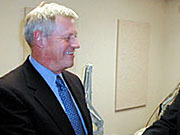|
|
Which candidates' views on the issues most closely match your own? Take our Select A Candidate survey.
|
Candidate Bio

Debates
Links and Resources
Candidate Pages
District Pages
|
Collin Peterson
SNAPSHOT
A country-music playing Democrat, Collin Peterson
feels more at home with President Bush than he did with former President Bill
Clinton. Then again, Peterson isn't shy about siding with Republicans on big
votes, such as prescription drugs and HMO legislation.
Peterson was one of seven conservative Democrats who formed the "Blue Dog"
coalition. It was a play on the phrase "Yellow-Dog Democrats," party loyalists
who would vote for a yellow dog if it ran on the Democratic ticket. Some Blue
Dogs say they were choked blue by their party. But Peterson has pulled back
some, complaining that the coalition has become too partisan and too focused
on elections.
Peterson is an avid hunter who brings to Capitol Hill an expertise in wildlife,
hunting and conservationn issues. This was no more apparent than during the
2000 session, where he fought to stop interstate shipping of birds for cockfighting
and promoted legislation to allow hunting of double-crested cormorants, birds
Peterson claims are interfering with sport fishing. He's also a licensed private
pilot and has an interest in aviation issues.
The way Peterson, who represents an expansive district in northwestern Minnesota,
puts it, "It took me a while out here to kind of find a niche." Nonetheless,
he has won re-election in the past couple cycles with ease.
Earlier in his last term, Peterson faced tougher challenges. He faced a challenge
from Republican former state Rep. Bernie Omann, who nearly upset Peterson
in 1992, losing by only one percentage point. Peterson fared a little better
in 1994; he won by two percentage points. Before deciding to seek —
and win — another term in 2000, Peterson was mentioned as a possible
challenger to U.S. Sen. Rod Grams. He also interviewed for the top natural
resources job in Gov. Jesse Ventura's administration, but Peterson said he
didn't get the right feel. In 2002, it was expected that Peterson would have
a tough fight with Republican state Sen. Dan Stevens, who moved from Mora
to Alexandria. But Peterson won with ease.
Peterson opposes a ban on handguns, instead suggesting legislation that would
mandate life in prison for anyone who commits a crime with a gun. Peterson
gained attention in 1998 when he proposed an amendment to the U.S. Constitution
that would allow the Northwest Angle's 100 residents to vote on whether they
want to secede from the United States and join Manitoba. The idea was to get
the Clinton administration to intervene in their dispute with neighboring
Ontario over the province's fishing restrictions, which prohibit people who
stay at Minnesota resorts from keeping any fish. Peterson favored a constitutional
amendment to prohibit abortions except to save the life of the mother and
in cases of rape and incest. He favors the death penalty.
In 1990, he defeated GOP incumbent Rep. Arlan Stangeland with 54 percent of
the vote. He was re-elected in 1992, narrowly defeating Republican former
state representative Bernie Omann with 50 percent of the vote to 49 percent.
He defeated Omann again in 1994, 51 percent to 49 percent. In 1996, he was
re-elected with 68 percent of the vote against Republican Darrell McKigney.
Peterson was re-elected in 1998 by defeating Republican Aleta Edin with 72
percent of the vote. In 2000, he beat Glen Menze with 69 percent of the vote.
Peterson was elected to the Minnesota Senate in 1976, and was re-elected in
1980 and 1982. He lost two bids for the U.S. House in 1984 and 1986, and a
four-way primary battle in 1988.
In 2004, Peterson faced a challenge from David Sturrock,
a teacher of political science. Peterson easily won re-election by a 66%-to-34%
margin. See
election results for the 7th District.
Republicans face uphill battle in the 7th
In Minnesota's 7th Congressional District, Republicans face an uphill struggle as they try to unseat incumbent Collin Peterson. Peterson is seeking his 8th term in the U.S. House. His challenger is David Sturrock, a Southwest State University political science professor from Marshall. (09/19/2004)
Farmfest's congressional forum
It's an election year, so more than machinery was on hand at this summer's Farmfest. Plenty of politicians were there, too, at the Gilfillan Estate near Morgan. The event will include a variety of candidates and government officials participated in a candidate forum. ( 08/06/2004)
Congressional candidates debate trade policies
Several hundred people at a congressional debate at Farmfest on Tuesday got a preview of the fall election campaign. Candidates from several Minnesota congressional districts tackled everything from rural education to ethanol. Some of the sharpest opinions concerned U.S. trade policy. (08/04/2004)
Minnesota suing North Dakota over hunting laws
Minnesota Attorney General Mike Hatch and Rep. Collin Peterson are suing the state of North Dakota over hunting restrictions. A North Dakota law passed last year restricts the first week of the waterfowl hunting season to North Dakota residents only. Hatch says the law discriminates against Minnesotans and other nonresidents. (03/09/2004)
Sturrock to challenge Peterson in 7th District
Southwest Minnesota State University professor David Sturrock said Tuesday that he'll run against 7th District Congressman Collin Peterson. (03/09/2004)
| Browse: |

